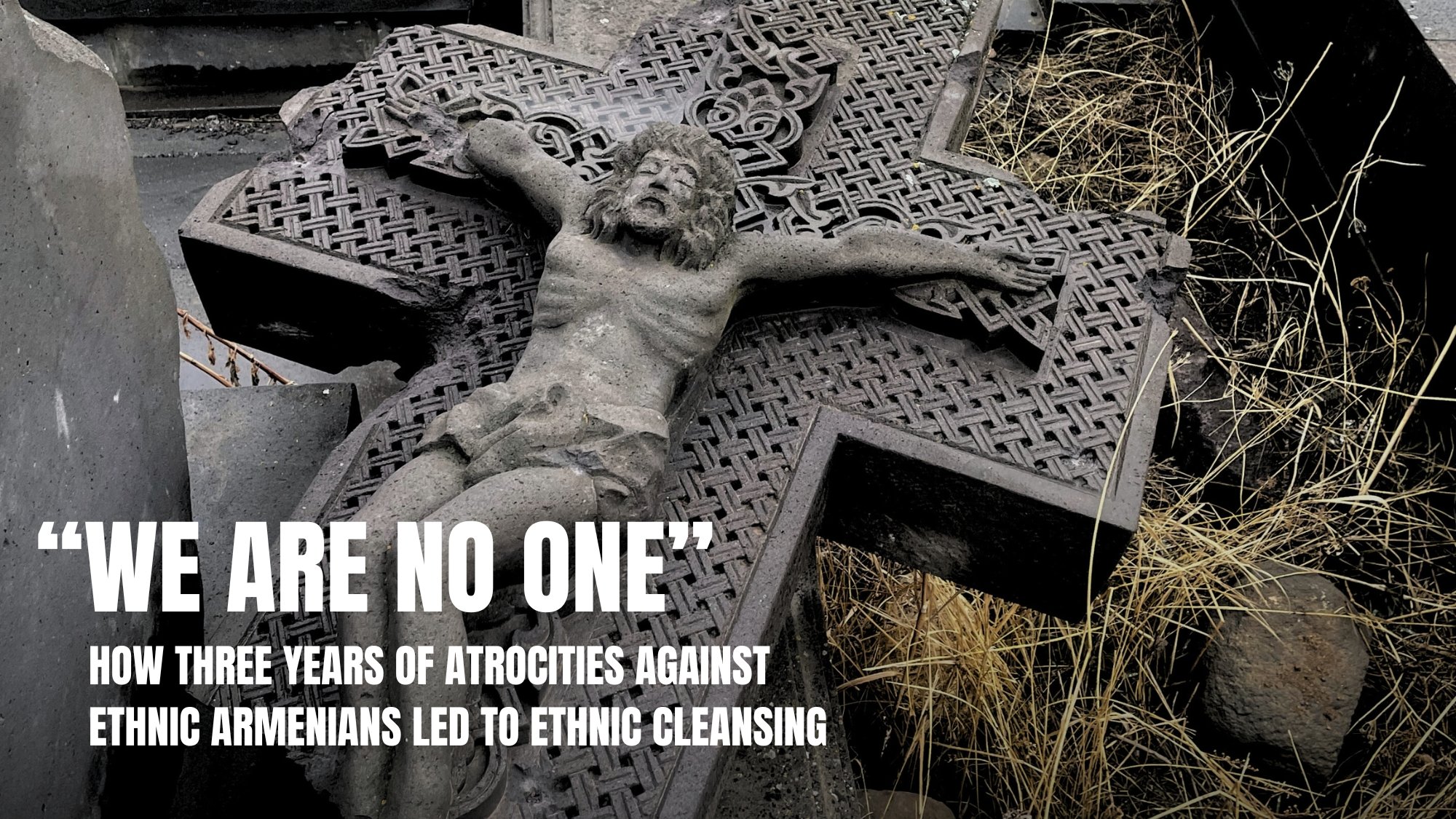Continuing Abuses Against Ethnic Armenians in Nagorno-Karabakh
Navigational Menu:
Reports, Briefing Papers, and Monitors
We Are No One: How Three Years of Atrocities Against Ethnic Armenians Led to Ethnic Cleansing (12 December 2023)
Chronicle of an Ethnic Cleansing Foretold: Four Years of Atrocities against Ethnic Armenians in Nagorno-Karabakh (14 November 2023)
Live Monitor of Ethnic Cleansing in Nagorno-Karabakh (22 September 2023)
The Tip of the Iceberg: Understanding Azerbaijan's Blockade of the Lachin Corridor as Part of a Wider Genocidal Campaign against Ethnic Armenians (24 August 2023)
Statements & Op-Eds
Newsweek Op-Ed: “Armenians Face a Second Genocide. Will the World Intervene?” UNHR Legal and Policy Director Thomas Becker (31 August 2023)
TIME Magazine Op-Ed: “Don’t Just Remember the Armenian Genocide. Prevent It From Happening Again.” UNHR Legal and Policy Director Thomas Becker (24 April 2023)
UNHR Calls for Urgent Protection of Vulnerable Populations in Armenia and Nagorno Karabakh (16 September 2022)
Statement on Azerbaijani Military Operations in Armenia (16 September 2022)
Current Highlight:
We Are No One: How Three Years of Atrocities Against Ethnic Armenians Led to Ethnic Cleansing
(12 December 2023) (Web Tool)
One year ago, 12 December 2023, Azerbaijan began the blockade of Nagorno-Karabakh. Beginning today, we are issuing one chapter each day of our comprehensive report documenting the systematic campaign to empty Nagorno-Karabakh and the border regions of Armenians. Read our executive summary at the link above.
Our findings are based on over 150 interviews conducted across multiple fact-finding trips – two in Nagorno-Karabakh and five in Armenia – between March 2022 and November 2023.
We spoke with forcibly displaced persons, families of missing or forcibly disappeared soldiers, families of victims of extrajudicial killings, returned prisoners of war, residents of Nagorno-Karabakh and border communities in Armenia, as well as numerous human rights, civil society, and media organizations that have collected testimony from hundreds of victims and witnesses corroborating Azerbaijan's widespread and ongoing abuses.
More information about our project and ongoing investigations below.
Wesleyan students Diego Olivieri and Annie McGovern interview a former prisoner of war, Gyumri, Armenia, March 2022.
Project Description
On September 27, 2020, a 30-year “frozen conflict” over the disputed territory of Nagorno-Karabakh erupted into 44 days of war between Armenia and Azerbaijan. While a peace agreement brokered by Russia formally ended the fighting on November 10, 2020, over two years on, human rights violations continue. At the same time, there has been almost no progress towards accountability for the extrajudicial killings, torture, arbitrary detention, enforced disappearances and forced displacement that occurred during the war.
THE ROLE OF THE UNIVERSITY NETWORK
Shortly after the war, students at Harvard, Yale, and Wesleyan joined forces under the supervision of the University Network for Human Rights to document the ongoing violations in Nagorno-Karabakh. In March 2022, the University Network undertook a factfinding trip to Armenia and Nagorno-Karabakh. Supervisors Thomas Becker and Tamar Hayrikyan led a group that included students from Wesleyan and Yale. Becker and a Harvard student conducted a follow-up trip in June. In March 2023, Becker and Hayrikyan led an additional follow-up trip with Wesleyan students and a Harvard Law student.
Our team found that, despite the presence of a Russian peace-keeping force deployed on the first day of the cease-fire, border populations continue to face physical attacks, harassment, and threats to life so severe that many ethnic Armenians have again been forced to flee their homes in search of safety.
As our team continues its investigation into post-war abuses, one thing remains clear: there can be no lasting peace while severe human rights abuses persist. Azerbaijan, Armenia, and the international community must protect vulnerable populations. The parties involved in the conflict must cease abuses and ensure access to justice and reparations for victims of human rights violations.
Read student reflections about their experience working on the project here and here.


